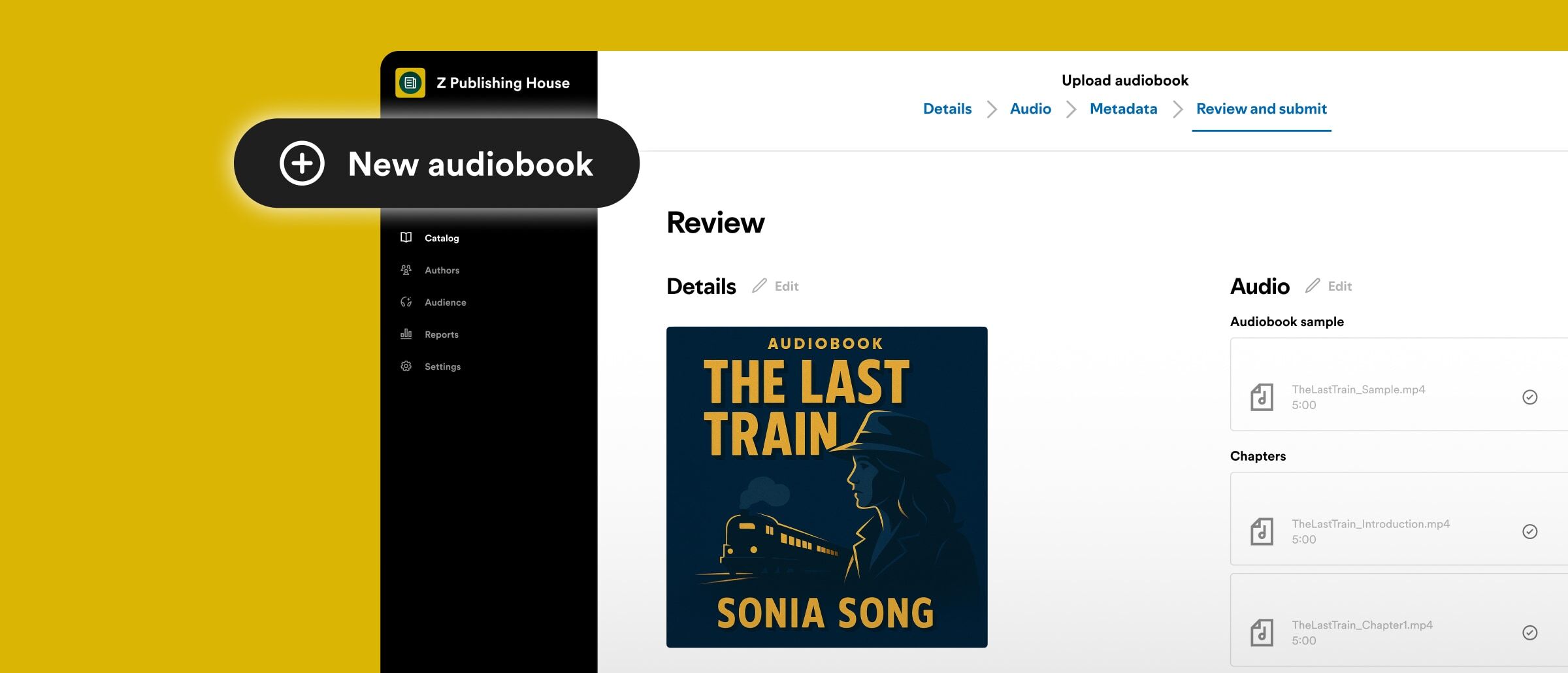Book marketing: 8 strategies to promote your audiobook to every pair of ears

Takeaways:
- Your author website is your home base. Make sure it’s a place where readers can learn about you, your work, and why your audiobook is a must-listen. Share personal stories, keep your content fresh, and offer audio samples to draw in potential listeners. Keep your social media links front and center so fans can stay updated on your latest news and releases.
- Social media is about building connections, not just promoting. Share behind-the-scenes content, engage authentically with your followers, and offer sneak peeks of your audiobook to build excitement.
- Team up with fellow authors to reach new audiences without direct competition. Cross-promotion strategies like sharing newsletter mentions, hosting social media takeovers, or creating joint content can help you multiply your reach.
As an author, you've poured your heart and soul into telling a great story. But a great story alone isn't enough to guarantee your audiobook’s success. You also need great marketing.
Marketing is the bridge that connects your audiobook to its ideal listeners. Without it, even the most captivating tales can remain undiscovered.
Thankfully, we live in a connected world. The internet, as the powerful democratizing force that it is, leveled the playing field for authors everywhere. Now, you have access to a wealth of marketing channels and strategies that can make a real impact on your career.
1. Craft a stellar author website
Your author website is your personal territory—a place where you control the narrative and showcase your work on your terms. This is where many potential fans get their first taste of who you are and what you have to offer, so make it count.
Write an engaging author bio to connect with readers on a personal level. Share what inspires you, what drives your creativity, and quirky tidbits that make you relatable. Did the idea for your latest book strike while you were hiking in the mountains? Let your personality shine through—readers will love getting to know the person behind the words.
As for your work, make sure your book descriptions are tantalizing enough to make potential listeners click the “Play” button. For audiobooks, emphasize what makes the audio experience unique. Will they get to hear your voice bringing the story to life, or did you work with a seasoned and compelling voice actor? Does your book feature a full cast or immersive sound effects?
Go a step further and offer generous samples to entice visitors. Consider sharing the first chapter so they can get hooked on the story and the narration. Try not to let your website stagnate. Keep it fresh with a blog or news section where you can share updates, behind-the-scenes insights, or your thoughts on the latest book industry trends. It will keep your site lively and give readers more reasons to return.
If you’re more active on social media, make sure you call that out in a prominent space so visitors can follow you for updates, announcements, and upcoming tours or signings.
2. Optimize your presence on audiobook platforms
Audiobook platforms are the main places where your potential listeners browse, search, and ultimately stream. Every author is looking for new listeners, though, so your sales pitch needs to be both professional and persuasive.
Each platform is a unique ecosystem with its own rules, features, and audience behaviors. But regardless of the marketplace, there are universal strategies you can employ to make your audiobook listing stand out:
- Write compelling blurbs. This is your movie trailer in text form. It should hook potential listeners, give them a taste of your story and writing style, and leave them hungry for more.
- Choose the right categories. Categories help listeners find exactly what they're looking for. Be as specific as possible–-if your book is a romantic comedy about vampires running a bakery, don't just list it under 'Paranormal.' Add 'Humor' and 'Romance' as well. Publishers have a lot of experience with this, so ask for their expertise.
3. Create engaging bonus content
Your audiobook's journey from page to earbuds is a story in itself. Behind-the-scenes content can give listeners a peek into the creative process and make them feel more invested in your work.
Consider sitting down for a casual conversation about the audiobook creation process, whether you worked with a narrator, a producer, or recorded it yourself. Discuss the highlights, challenges, and funny moments you encountered along the way. If you're not comfortable leading the conversation solo, have a friend, colleague, or even a fan interview you about the process.
Short videos or photos of you or your narrator at work can also be fascinating. Set up a camera to capture tidbits like preparing for an emotional scene, experimenting with different character voices, or making mistakes and laughing them off. Moments like these are human and authentic. They can endear you to potential listeners and make them feel connected to the story before they even listen to it.
If you self-recorded, consider giving fans a tour of your setup. You could walk them through your home studio, share your recording routine, or explain how you approach different character voices.
Once you've created all this content, promote it! Share snippets on social media, create a dedicated section on your author website, and add it to your newsletter. Plus, collaborate with your narrator or production team to cross-promote, leveraging their audiences as well.
4. Be strategic with your social media presence
Chances are, you already have a presence on at least a couple of social media channels. So the question isn’t whether you should use them, but how.
You don’t want to shout your book’s title into the void and be done with it. Rather, you want to engage in a dialogue with your potential listeners, create a community around your stories, and give your audience a backstage pass to your life as an author.
Each platform is a unique opportunity to connect with your fans. Facebook, for example, can serve as a hub for building a community around your work, offering a space for discussions, updates, and exclusive content. Instagram and TikTok excel at visual storytelling, where you can share eye-catching cover art, behind-the-scenes glimpses of the recording process, or short clips from the audiobook itself. If you’re in the non-fiction genre, LinkedIn could be a goldmine for connecting with professionals interested in your subject matter.
There are a series of strategies that will help you succeed across channels, chief among them:
- Set a posting schedule. Consistency builds anticipation and keeps your followers engaged. A content calendar can help you plan posts in advance, ensuring a good mix of promotional content, behind-the-scenes glimpses, and interactive posts that encourage engagement.
- Engage authentically. Respond to comments, ask questions, and show genuine interest in your followers. The more you engage, the more your audience will feel connected to you and your work.
- Leverage user-generated content. Encourage your fans to share photos or videos of themselves enjoying or reviewing your audiobook, and with their permission, repost the content. You get great social proof out of the deal while making your followers feel like they’re part of your story.
- Share audio snippets leading up to release dates. A 15-30-second clip that ends on a cliffhanger can build excitement and encourage pre-orders before the audiobook is out.
- Promo Cards - making a promo card for your audiobook can now be done in one-click with Spotify for Authors - a great way to share your titles on social.
5. Start an email newsletter
An email newsletter provides a direct line of communication with your audience. Unlike social media platforms, email ensures your message reaches your subscribers' inboxes reliably.
If you do venture into email marketing, share updates consistently. Whether you choose to send your newsletter weekly, monthly, or bi-monthly, sticking to a regular frequency keeps your audience connected and looking forward to your content.
Speaking of email content, make sure you diversify it. Include a healthy mix of updates—insights into your writing process, personal anecdotes, book recommendations, or whatever strikes your fancy while holding reader interest. Of course, there’s also the promotional aspect. This is your chance to share updates about new releases, promotions, and reminders for your fans to recommend your titles to friends and family.
6. Be a guest on relevant podcasts
There are millions of podcast listeners out there, and many shows that would benefit from having you as a guest. Each podcast appearance is a chance to show off your storytelling chops, share insights about your work, and connect with potential listeners who are already tuned into audio content. On Spotify, podcast hosts can even link to your audiobook using Spotify for Podcaster’s host recommendations.
When seeking podcast opportunities, cast a wide net. Sure, book-related podcasts are an obvious choice, but don't stop there. Tech podcasts might be interesting if your mystery novel revolves around a cyber-security expert. Did you write a historical romance set in 19th-century Paris? A history podcast could be your ticket to new audiences.
Once you shortlist a few options, reach out to the podcast hosts with a clear, concise proposal ready. Highlight the unique value you bring to the table, drawing connections between your audiobook and their content.
If you land an appearance, promote it on your social media channels, website, and newsletter. Share links to the episodes, thank the hosts publicly, and encourage your followers to tune in. It’ll help drive traffic to the podcasts (making hosts more likely to invite you back) and flaunt your expertise and media presence to your own audience.
7. Cross-promote with other audiobook authors
As the saying goes, a rising tide lifts all boats. Teaming up with fellow authors can create quite the tidal wave of promotion, multiplying your audience without directly competing.
Look for authors in complementary genres or with themes that align with yours. If you write cozy mysteries set in bakeries, why not collaborate with a romance author whose stories revolve around coffee shops? Find that sweet spot where your audiences overlap just enough to be interested in each other's work, but not so much that you're fighting for the same exact readers.
Once you've found your cross-promotion partner, there’s a variety of tactics you can explore together:
- Exchange mentions in each other’s newsletters. It’s a simple but effective way to introduce your work to a new, receptive audience. A short blurb about each other’s audiobooks, along with a link, can work wonders.
- Spend a day running each other’s social media accounts. This will allow you to introduce your work to a new audience and give your current followers fresh and exciting content to enjoy.
- Work together to create unique content. It can be a podcast episode where you discuss your writing processes, a YouTube series where you challenge each other with writing prompts, or a live Q&A session. These events can draw larger audiences than solo endeavors and provide valuable content for your listeners.
8. Ignite buzz with giveaways and promo codes
Sometimes, giving a little can help you gain a lot. Offering free copies or discounts might seem counterintuitive, but they're both powerful ways to boost your audiobook's visibility and attract new listeners.
Consider gifting copies to book reviewers and social media influencers. BookTok, BookTube, and Bookstagram are breeding grounds for audiobook promotion, with plenty of influencers who can introduce your work to a vast, engaged audience that already trusts their recommendations. Spotify for Authors makes this process easy—with “Redemption Codes,” you can share royalty-free copies with fans, bloggers, and all manner of influencers in the book world.
Promo codes are another great tool, as they create a sense of exclusivity and urgency that can drive up your sales. Try offering limited-time discounts to newsletter subscribers or sharing codes on your website and social channels as pre-order incentives.
Just remember to use these strategies judiciously. The goal is to create buzz and attract genuine listeners, not devalue your work. Always have a clear goal in mind, whether it's gathering early reviews, rewarding fans, or drumming up interest in a new release.
Test, iterate, succeed
Don’t hesitate to experiment with platforms, test different types of content, and closely observe what drives engagement versus what falls flat. Just like your story evolved through drafts, your marketing will get sharper and stronger as you adapt along the way.


